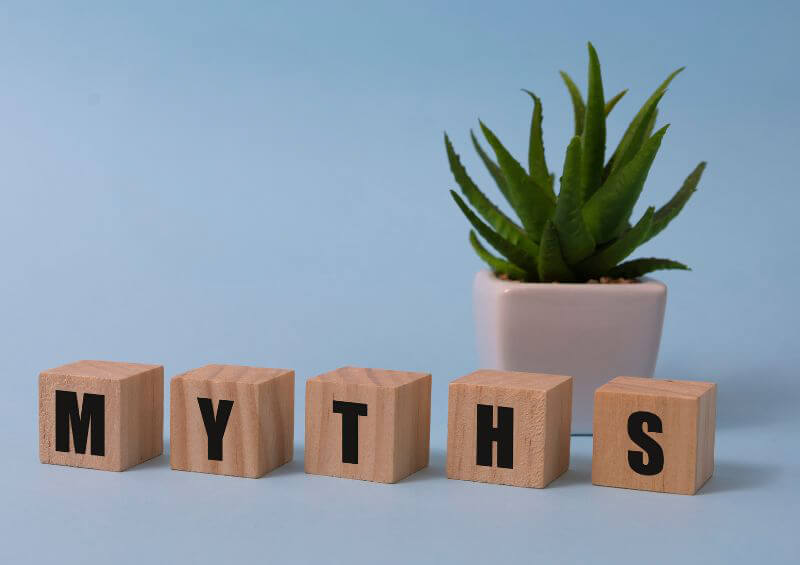There are many misconceptions and societal stigmas about hearing loss. Too often, they prevent people from seeking the care they need to live an enriching life with hearing aids.
In fact, there are several things we have wrong about what it means to have hearing loss. With the evolution of modern technology and new advances in hearing healthcare, some of the most common hearing loss myths can be easily debunked.
If I Had Hearing Loss, I Would Know
The signs that point to hearing loss can be difficult to detect on your own. Many times, the people closest to us notice before we do. Keeping an open mind to the concerns of those who know us best is the first and easiest step in identifying and preventing further hearing loss.
While hearing loss can progressively worsen over time, it is usually low-volume and high-frequency noises that disappear first. For example, you may be able to hear a running vacuum, but perhaps you can no longer hear the high-pitched chirping of birds outside or a whisper from a person next to you.
It’s important to be vigilant about recognizing potential hearing loss because most primary care doctors don’t test for it in annual check-ups. To find out if you have hearing loss, schedule an appointment with a local audiologist to perform a hearing exam.
My Hearing Loss Isn’t Hurting Anyone
Ignoring potential hearing loss can put you at risk for more than just missing out on important conversations. Risks of progressive hearing loss include a greater chance of developing dementia, an increased risk of falls, further hearing damage, and even isolation from friends and family.
A study by Johns Hopkins found that hearing loss and dementia were directly related, with hearing aid users having a lower likelihood of developing dementia than their hard-of-hearing counterparts.
But hearing loss isn’t just physically damaging, it can be mentally harmful as well. As humans, we depend on social connections to thrive in our lives and communities. When basic communication becomes difficult such as hearing and responding to the people we care about, we can unintentionally become isolated and lonely.
Hearing Loss is Normal At My Age
There’s no denying that there are a lot of changes that occur in our bodies as we enter our older years. But there’s no reason to think that this is something you should have to endure without treatment. If you had trouble seeing, you would get glasses, wouldn’t you?
Typically, hearing loss is a result of damage to the inner ear from exposure to loud noises over time. Meaning that as we are exposed to more noise and sound over time, our ears become progressively more damaged. For some, this begins earlier than others.
Fortunately, this also means that once treated with hearing aids, your hearing loss is less likely to continue to decline, and together with your audiologist, you can better protect what hearing you still have.
Hearing Aids Won’t Help
Hearing aids capture the sounds around you and amplify them for the level of hearing you still have. So while its true that they won’t work for those who are deaf, they can still work quite well even if you already have severe hearing loss.
With modern testing procedures, advances in hearing aid technology, and more accurate hearing aid fittings, hearing aids have never been more equipped to help you navigate your life.
Hearing Aids Will Make Me Look “Older”
There’s a common misconception that hearing aids make you look “older”—but this couldn’t be further from the truth. Hearing aids can help you better navigate social situations and ensure you remain involved in the activities you enjoy.
But if the idea of hearing aids is still intimidating, know that in reality, about 5% of adults aged 45-54 and 10% of adults ages 55-64 have disabling hearing loss, so you’re not alone.
And, if you’re concerned about the appearance of a hearing aid, most hearing aid manufactmmurers are aware that you may not want to advertise your new tech, so they provide discreet options in varying skin tones and small sizes for you to choose from.
Challenge What You Know About Hearing Loss
As we age, there’s no doubt that hearing loss is a relevant concern. However, challenge what you thought you knew about hearing loss to embrace the potential for an improved quality of life.
While the hearing loss myths we heard growing up may be ingrained in us, they don’t have to define the actions we take for our health today.
Book your free hearing consultation today to get to the bottom of if you have hearing loss—and what you can do about it. Schedule your free appointment at 727-584-9696

